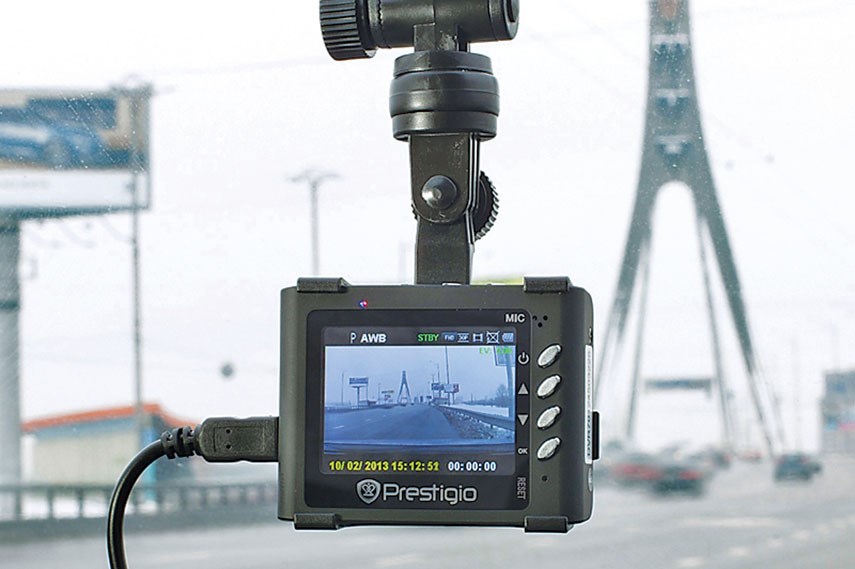“Did you see that guy?”
All of us, at one stage or another in our driving lives, has uttered that phrase. Did you see that guy speeding? Cutting the corner? Picking his nose? Driving with one foot out the window? Catching Pokemon on an iPad?
We’ve seen it all, and if anything, people seem to be getting more outrageous. Pile on the pending increase in ICBC fees (blamed on worsening drivers, likely also caused by political mismanagement), and you’re probably thinking about getting a dashcam to protect yourself.
A dashcam, as you already know, is a small digital camera mounted on the dash. Much like the camera on your laptop, which is even now broadcasting footage of you doing karaoke in your underpants to parts of Siberia, a dashcam is compact and innocuous-looking, but also a powerful tool.
Let’s say you pull up behind a stopped car, one waiting for a parking spot. Suddenly, they reverse without looking, and smash into your bumper. The owner hops out with an apology, then suddenly changes his tune: you ran into him!
I witnessed this very thing happen in Deep Cove one early Saturday morning. Worse, the reversing car had two people in it, both with the same story. Happily, both jerks changed their tune when they saw a third party had seen the whole thing.
In the case of the dashcam, the third party is as purely disinterested as you can get. It records what actually happened, and thus, you’re protected. There’s even a movement afoot to have dashcams installed to help reduce your insurance rates.
Me? I’m not so sure. While being recorded in a public place – and the road is just such a public place – is part of modern life, the amount of things we’re having foisted on us as ways to reduce our insurance rates should be kept in strict check.
Let’s try another scenario. You’re driving along in heavy traffic, and suddenly spot the person next to you texting while driving. That maniac! You adjust the dashcam slightly to the right, then later submit the footage to your local police. The footage shows you adjusting the camera – so you both get charged with distracted driving.
As a personal tool that would be useful for drivers to record footage in the case of a collision, I’m all for dashcams. As something that might become mandatory in order just to have a reasonable insurance rate, maybe not.
Let’s look at another device intended to help safe drivers get a break on their premiums: Event Data Recorders. Your car likely already has one of these installed, and it’s much like the proverbial black box on an airplane. In the event of a more serious collision, information can be downloaded through your onboard diagnostic port. Accident investigators can then use the information to figure out what happened.
That’s fine. Less fine is the idea floated by several insurance companies of installing a transmitting device in the diagnostic port, one that works with GPS to send information about your driving habits to the insurance company. Suddenly, you’ll get a break if you’re a safe driver.
Why, that sounds just dandy, doesn’t it? After all, you’re a safe driver, aren’t you? Who wouldn’t want to take advantage of that? What do you mean you’re denying my claim because I entered the intersection at 52 km/h before being T-boned?
And what if you happen to have a commute into the North Shore that uses the Upper Levels highway? Driving on the highway is more dangerous than on streets. Driving during certain weather conditions or winter months is less safe. Night is worse. Are we ready for Uber-like surge pricing for our road insurance?
Willingly providing your driving data to an insurance company (or to a manufacturer: take heed, Tesla owners) is a gamble. You’re betting that they’ll only use the information to cut you a break, rather than as a tool to reduce payouts should an accident happen. Human beings being imperfect in many ways, especially driving, those aren’t good odds to be playing.
There is, however, one thing the insurance companies are going to foist on us that will work for the public good: automatic braking systems. Just as the seatbelt and the airbag became mandatory, auto-brake will be legislated into existence at some point, and will do much to keep people from reversing into your bumper and driving your insurance up. The rollout will probably take years, but it’ll arrive long before autonomous cars.
In the meantime, go ahead and examine whether a dashcam might be a sound investment for your car, but bear in mind the erosion of privacy. All of the information you collect and provide to insurance companies can be used in any way they see fit. If you think it’ll only be used for good, well, perhaps you haven’t seen those guys.
Brendan McAleer is a freelance writer and automotive enthusiast. If you have a suggestion for a column, or would be interested in having your car club featured, please contact him at [email protected]. Follow Brendan on Twitter: @brendan_mcaleer.



